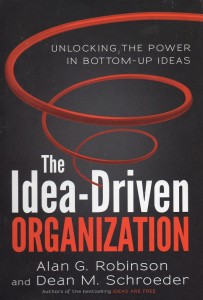Book Review: The Idea-Driven Organization by Alan G. Robinson & Dean M. Schroeder
Disclaimer: I received a copy of this book through the Goodreads giveaway program on the premise that I would review it.
This is a follow-up to the authors’ 2004 book Ideas Are Free, in which they made a case that innovation can be driven by ideas presented by front-line employees, rather than imposed from above by management, or restricted to a particular department. Since then, they’ve consulted on various organizations’ new idea processes and have more insights, as well as some updated information.
Many of us are familiar with the old suggestion box method of getting ideas from employees–and how seldom it seems to make any difference. While reading this book, I happened to chat with a fellow who had put suggestions in his company’s box for twenty years, often getting cash prizes for the best idea that month. A grand total of zero of his ideas were ever acted on.
The authors touch on many of the obstacles to making an organization idea-driven, from leadership that’s out of touch with the common workers, through managers who won’t work with other departments, to demoralized employees who’ve been told for years that their ideas are “too expensive” or “just whining.” In many cases, putting an idea process in place may require some major rethinking of management policy.
They also give many guidelines for a successful reorganization of the idea process. One of the most important is to have a pilot program that allows the organization to see where any roadbumps are before trying to impose the new process on the entire organization at once. The book also stresses the importance of getting everyone on board, starting from the leadership team on down.
There are copious real-world examples cited throughout; the unsuccessful ones have the company’s name withheld to avoid embarrassing them. There’s a short end notes section and an index. The book is designed to be used as a textbook or supplemental reading for business school classes, with a helpful summary of the main points at the end of each chapter.
I am taking a business management degree, so found this book interesting and informative. It’s likely to be less interesting to those without an interest in organizational structure or business management. Perhaps you might consider it as a gift to a CEO you know?


The CEO’s really should pay a bit more attention to what their employees have to say…after all they are usually the ones down on the front lines face to face with the customers.
One would think, yes. There are still a lot of top executives left from the 80s school that believe that short-term profits are the only guiding principle.